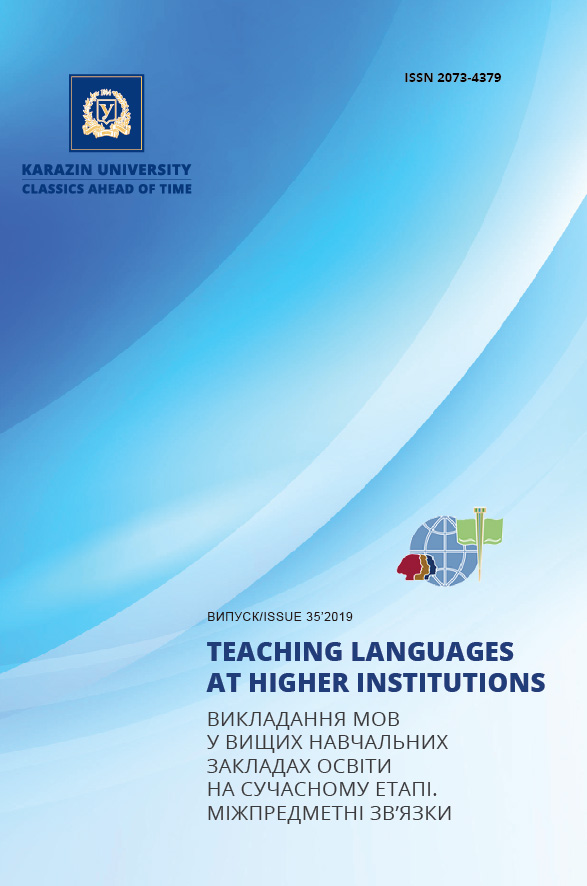From pedagogic control, correction and assessment to self-control, self-correction and self-assessment
Abstract
The article deals with the methods that allow developing mechanisms of self-control, self-correction, and self-assessment in foreign students. These mechanisms are based upon open and hidden pedagogic control, the use of transparent assessment criteria, and timely analysis of common errors. The authors describe the formation stages of internal self-control, the development of which is characterized by a decrease of the teacher’s pedagogic controlling influence. Attention is drawn to the efficiency of the teacher’s flexible approach in regulating a methodically sound balance of pedagogic assessment and self-assessment of their speech activity by foreign students. The authors present a subsystem of special tasks to form mechanisms of self-control, correction, and self-assessment as well as the general requirements to the content of such tasks. They also offer their recommendations for the prevention of errors according to their classification: 1) violation of language system; 2) violation of language norms; 3) violation of usage. The article contains pedagogic strategies related to the organization of the purposeful progressive transition from the teacher’s external controlling, corrective and assessing actions to the formation of mechanisms of self-control, self-correction, and self-assessment in foreign speakers. The authors demonstrate that a purposeful pedagogic activity promotes a reduction of time needed to overcome the language and speech issues, provides for a relatively errorless speech activity of foreign speakers and positively affects the development of their communicative competence. Other necessary components include a precise organization of the learning process, use of quality teaching aids, a rational balance of test and non-test forms of control and availability of special text-book assignments with answer keys.
Downloads
References
Azimov, E.G. and Shchukin, A.N. (2009). Slovar' metodicheskikh terminov i ponyatiy (teoriya i praktika оbucheniya yazykam) [Dictionary of methodological terms and concepts (theory and practice of language teaching)]. Moscow: IKAR [in Russian].
Boginya, L.V., Savitskaya, T.V. and Trusova, L.V. (2013). Samostoyatel'naya rabota kak odin iz vazhneyshikh faktorov podgotovki inostrannykh studentov podgotovitel'nogo otdeleniya k obucheniyu v VUZe [Independent work as one of the most important factors in the preparation of foreign students in the preparatory department of education at a university]. Svit medytsyny ta biolohiyi [The world of medicine and biology]. Poltava: Medychni i biolohichni nauki, 2 (37), pp. 23–26 [in Russian].
Kurovska, O.V. (2004). Zabezpechennya zvorotnoho zvyazku v rozvytku navychok pys’ma [Provide feedback in the development of writing skills]. Naukovi zapysky [Proceedings]. Kyiv: Kyyevo-Mohilyans’ka akademiya, 34, pp. 54–63 [in Ukrainian].
Passov, Ye.I. (1989). Osnovy kommunikativnoy metodiki obucheniya inoyazychnomu obshcheniyu [The basics of communicative teaching methods of foreign language communication]. Moscow: Rus. yaz. [in Russian].
Ushakova, N.I. (2017). Formirovaniye u obrazovatel'nykh migrantov umeniy samostoyatel'noy deyatel'nosti sredstvami uchebnika po yazyku obucheniya [Formation of skills of independent activity in educational migrants by means of a textbook on the language of instruction]. Akademicheskaya adaptatsiya obrazovatel'nykh migrantov v strane obucheniya [Academic adaptation of educational migrants in the country of study]. Kharkiv: V.N. Karazin Kharkiv National University, рр. 92–104 [in Russian].
Vereshchagin, Ye.M. and Kostomarov, V.G. (1989). Yazyk i kul'tura [Language and culture]. Moscow: Rus. yaz. [in Russian].
Zimnyaya, I.A. (1989). Psikhologiya obucheniya nerodnomu yazyku [Psychology of learning a foreign language]. Moscow: Rus. yaz. [in Russian].

